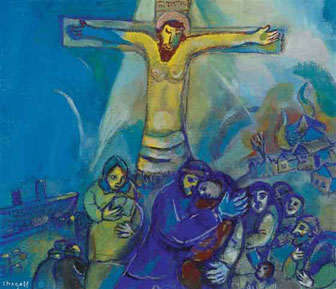
The Good Old Days by Deborah Beach Giordano
And they all lived together happily…
Ah yes, the Good Old Days: when all Christians lived together in harmony; the wealthy giving generously, the needy cared for, the elders wise and good and trustworthy, and every sermon engaging and inspiring (!). Just one big fluffy bundle of love and charity. It’s the ecclesial version of the Garden of Eden — with not so much as an eyelash of an apple-peddling serpent in sight.
 Every country, culture, and tradition has an origin story, a tale purporting to describe a (long-ago) time of perfect understanding, abundance, peace, and goodwill. And the sun was always shining, too.
Every country, culture, and tradition has an origin story, a tale purporting to describe a (long-ago) time of perfect understanding, abundance, peace, and goodwill. And the sun was always shining, too.
So, too, with our imagining of the Early Church, where everybody got along, and all were “of one mind”: free from conflicts and complications. It sounds great, but it doesn’t sound very likely. You know how we are, we people — with our opinions and interpretations, histories and habits, preferences and phobias….
Facing Reality
Wherever two or more are gathered together,
there are (at least) three opinions.
~ anonymous
We human beings are gloriously wrought (and sometimes distressingly over-wrought): each of us with our own gifts and graces, wisdom and lived experiences. It is a wondrous blessing. Troubles arise when one or more of us “knows” something, while one or more others “knows” something quite different. The situation heats up when the subject is near and dear to our hearts; then it is no longer “a matter of opinion,” but an issue of Right and Wrong: it becomes a concern we are willing to fight for. And fight, we do.
Sides are chosen, battle lines are drawn, and friendships begin to unravel. Members leave, clergy relocate, congregations split, resentments linger. Then, like a holy revelation, this fantastic Ideal is proclaimed from the lectionary text: when the Christian community was a place where people cared deeply and truly for one another, and no one was in need.
 And I wonder:
And I wonder:
Doggone it, why can't it be like that?
Why can't we be a big fluffy bundle of love and charity?
Why can’t we be what we can imagine: the community of care and compassion that we have been called to be?
The Way of the World
Well, these things happen.…
It’s so easy to throw in the towel, to surrender to division and distrust as “typical church politics” and let it go at that. But why? And why has the situation gotten so much worse over the last few years? I hear it from all directions: no longer are the issues minor squabbles over budget items or seasonal banners or who left dirty dishes in the fellowship hall; now battles are waged over the state of peoples’ souls.
That sounds quite laudable — right in keeping with the work of the church. Unfortunately, these concerns are not based on issues of faith like those that excited our ancestors in “the good old days”: transubstantiation, homoiousios vs. homoousios, or the angelic population that could be supported on the head of a pin. Nothing like that. Now great and terrible dividing lines are drawn between those holding beliefs that differ within political categories.
 We’ve chosen to partake of the cultural Kool-aide rather than the Wine of the Eucharist. Church has become political and politics has become a religion — complete with True Believers, Zealots, and Heretic-hunters. The very Community that is called to bless and heal — to offer a “safe zone,” to be a sanctuary for all people — has turned into a branch of the divisive culture it is meant to refute.
We’ve chosen to partake of the cultural Kool-aide rather than the Wine of the Eucharist. Church has become political and politics has become a religion — complete with True Believers, Zealots, and Heretic-hunters. The very Community that is called to bless and heal — to offer a “safe zone,” to be a sanctuary for all people — has turned into a branch of the divisive culture it is meant to refute.
It is nothing less than idolatry: an unfettered, reflexive adoration (or loathing) of a particular person or political party or policy. In our enthusiasm we forget that no mere human is without spot or stain or fault, neither is any one the incarnation of all evils, devoid of redeeming potential. We have become enthralled with an idea that overpowers everything else: all thought, all reason, all compassion, all faith in the Path that the Lord Jesus of Nazareth walked and proclaimed.
The ancient Hebrews who worshipped that golden calf had nothing on us!
There will be voices raised in denial: Oh no, we don’t preach politics — that would endanger our tax-exempt status (speaking of golden calves). But anyone who has spent more than a couple of Sundays in the pews has heard the inferences, innuendos, pointed jokes, pastoral prayers, and weekly announcements and knows full-well which way the wind blows. It isn’t Christianity, it’s a pep rally for “our team.”
Meanwhile, there is much weeping and gnashing of teeth over the decline in church attendance.
Back to Basics
And I wonder.
In our prejudice against those who fail to share our political outlook — the ones we shun, exclude, ignore, and despise — how we are different from those of earlier times who have considered themselves superior; the self-determined arbiters of right and wrong? Some of them lighted the fires that burned witches, others broke hundreds of windows on a single night, and some condemned an itinerant rabbi to be crucified. The cold cruelty of righteous conviction is a deadly danger.
Instead, what would it be like if we loved one another? What would it be like to visit the ill and the house-bound, to care for those in need, to welcome the stranger, to bless and encourage; to be a community of compassion — not just toward those on our “acceptable” list, but to everyone, even the people with whom we disagree? What if we were as kind to those who aren’t “one of us” as we are to those we have chosen to accept?
“But they are in the wrong!” is the insistent cry, “They support abject evil! That means that they are evil, too!”
Oh? And who are we to judge? and, much more to the point: So what?
 Jesus prayed for forgiveness for those who had scorned, abused, condemned, tortured, and forsaken him — even as he suffered on the cross. And we’re … what? too holy, too fragile, too pig-headed … to have compassion on those we have determined to be “sinners”???
Jesus prayed for forgiveness for those who had scorned, abused, condemned, tortured, and forsaken him — even as he suffered on the cross. And we’re … what? too holy, too fragile, too pig-headed … to have compassion on those we have determined to be “sinners”???
Let’s ask ourselves that ever-so-popular question: What would Jesus do?
He’d love the hell out of us.
Conversion Therapy
The other great temptation is to use an Open Door policy as a sly form of conversion therapy: welcoming people in, and then trying to “fix” them by convincing them that our views are the right ones. That would be a deceitful and, frankly, a wicked misuse of our Christian calling. The true conversion should take place in us, when we trust in the Gospel to do what it has always done: open the hearts of the hearers and fill them with compassion and good will toward all people. And that means opening our hearts, as well.
It is not our job to tell others what to think; instead, the Gospel teaches us how to think: to make decisions from within the context of the life and teachings of the Lord Christ. If prayerful, mindful, heartfelt consideration leads to differing choices (as it most surely will); that doesn’t mean someone has to be wrong. It doesn’t mean that somebody must be harboring evil intentions. It proves that people of goodwill will sometimes disagree — and it is an opportunity for all of us to show that we are people of goodwill by our willingness to disagree civilly, and to continue to care for one another, regardless.
That’s a pretty tall order, to be sure. Nobody said that being a Christian is easy. We have been called to “love one another, as Christ has loved us” (John 13:34 ); we are to pray for one another, to seek the best for one another, to look at one another as if through Christ’s eyes: as beloved children of God. If we trust in the Gospel, all else will come into focus.
No one said it was going to be easy. But it is Ultimately Important.
The Proof….
To strive to love and care for one another is a supremely counter-cultural act, made all the more difficult by the hatred and hostility we will encounter by doing so. Contempt for and condemnation of those with whom we disagree is celebrated in our society as proof of our own noble nature, evidence of our membership in the Right Thinking battalion; to cease doing so will call our loyalty into question: we will be accused of heresy, and be suspected and shunned as enemy agents. It is expected that our devotion to The Cause is greater than our faith in the Way that Jesus taught. Be forewarned.
 Know, too, that there’s nobody we need to hate. There’s nobody we need to feel superior to, nobody we need to demean or harm or cause distress. Like the Samaritan in Jesus’ parable, we are called to be caring and compassionate to whomever we find along the road, regardless of what “side” the person is on. We don’t prove our faithfulness to the Lord Jesus by who we condemn, but by who we have compassion for.
Know, too, that there’s nobody we need to hate. There’s nobody we need to feel superior to, nobody we need to demean or harm or cause distress. Like the Samaritan in Jesus’ parable, we are called to be caring and compassionate to whomever we find along the road, regardless of what “side” the person is on. We don’t prove our faithfulness to the Lord Jesus by who we condemn, but by who we have compassion for.
By this all people will know that you are My disciples,
if you have love for one another.”
~ John 13:35
Embodying the Possible
And that brings us back to the beginning; to our Ideal: to that big fluffy bundle of love and charity.
If we can imagine it, if we yearn for it — as I know so many of us do — then surely we can commit ourselves to work for it; to making it a reality. Perhaps that story in Acts is not a lovely fantasy of what might have been, but an accurate report of how things were. And, perhaps, of how things can be again.
Perhaps those early Christians weren’t all that different from us. Perhaps the difference is their faith in the Gospel; in their commitment to living as Jesus told His disciples we are to do. Surely they had their disagreements and disputes — that’s human nature, but as citizens of Christ’s kin-dom, they found it in their hearts to love and care for one another. No matter what.
O Lord, open our hearts,
And our lives shall show forth praise.
Virtual hugs and real-time blessings,
Deborah ✝
Suggested Spiritual Excercise
Pray for peace — in our world, in our nation, in our communities, and in ourselves.
Dear children, keep away from anything that might take God’s place in your hearts.
~ 1 John 5:21